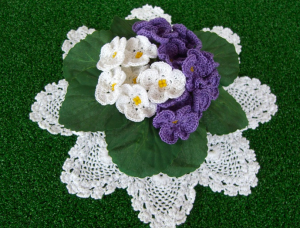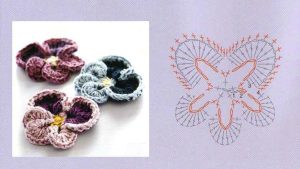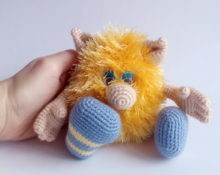
Do you want to surprise your loved ones with an unusual and original gift? Do you dream of making your loved one happy for a long time?
Create a flower garden with your own hands and place it on the windowsill of your loved ones. There are many options for creating such a surprise, but in this article you will find a way to make a beautiful and bright bouquet of violets using a hook and thread.
Action plan step by step
Violet is a herbaceous plant with purple petals (hence the name), so base your combination on this color or your preference.
You will need:
- thread No. 8 made of cotton or wool (for petals - purple, pink or lilac; for leaves - any shade of green);
- hook No. 2;
- any wire to create a stem;
- tape in a reel with an adhesive effect to match the color of the leaves;
- yellow or orange beads (3 pieces per 1 flower).

Forming an ensemble
To knit a violet flower itself, you don’t need to be a professional. It's easy to do and won't take much time.
We collect a chain of 5 air loops and connect them, forming a ring.
We knit the 1st row in a circle: insert the hook into one of the loops of the ring and start: ^ 1 tbsp. b/n.; 4 carts loops; 1 tbsp. with 2 n.; 4 carts loops. We play with ^ 4 times and end with 1 p/st. b/n.
For a full-fledged bouquet, it is enough to make 9-11 buds.
We take 3 beads, string them on a wire, secure them with a twisting motion, and thread them through 2 petals.
We wrap the stem of the flower with adhesive tape used by florists. We connect 3 petals together, creating a violet umbrella.
As with the flower, making leaves is not a complicated process. All you need is ingenuity and patience.
We knit a ribbon from 8 flying loops and connect it into a circle.
We saw off about 12 cm from the wire and wrap it around a ring of thread. We tie it, strengthening the leaf.
1st ring row: 1 tbsp. b/n.; 1 p/st. s/n.; 3 tbsp. s/n.; 4 tbsp. with 2 n.; 4 tbsp. from 3 n.; 4 tbsp. with 2 n.; 3 tbsp. s/n.; 1 p/st. s/n.; 1 tbsp. b/n.; we complete 1 p/st. b/n.
2nd row: 1 tbsp. b/n.; 1 p/st. s/n.; 2 tbsp. s/n. on the 1st pet. 3 rubles; 2 tbsp. from 2 n. on the 1st pet. 3 rubles; 2 tbsp. from 3 n. on the 1st pet. 3 rubles; 3 tbsp. from 4 n. on the 1st stitch; 2 tbsp. from 3 n. on the 1st pet. 3 rubles; 2 tbsp. from 2 n. on the 1st pet. 3 rubles; 2 tbsp. s/n. on the 1st pet. 3 rubles; 1 p/st. s/n.; 1 tbsp. b/n.; 1 p/st. b/n.
We knit 4 more of the same leaves and wrap the wire with adhesive tape.
We assemble the structure: take a flower pot, fill it with plasticine and insert flower stems with leaves attached to them.
Designations:
- Pet. - a loop;
- Art. - column;
- P/st. - half-column;
- S/n. - double crochet;
- B/n. - single crochet;
- Voz.—air.
You can experiment and come up with something interesting and individual. Be based on your fantasy and imagination.Create a larger bouquet or make several rows of flower petals.
There is an opportunity to work on a pot - make it yourself. To do this, take a plastic bottle, cut off the top and tie a cover of any color for it to hide the entire piece. Insert the bouquet into it and knit 3 rows, reducing the number of loops in each, closing the edge. You can, as in the description above, fill it with plasticine or plaster. When it hardens, distribute the composition, constructing a bouquet.
An exquisite and unusual gift is ready. Try knitting too!


 0
0





